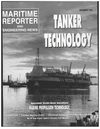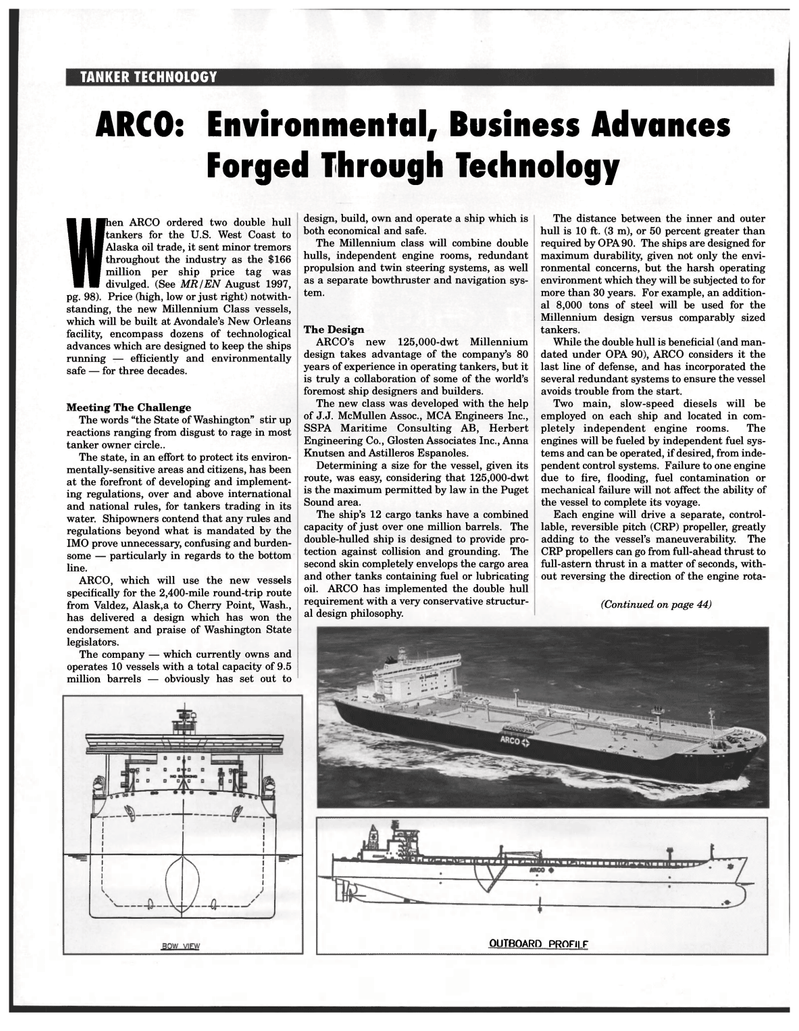
Page 42: of Maritime Reporter Magazine (September 1997)
Read this page in Pdf, Flash or Html5 edition of September 1997 Maritime Reporter Magazine
TANKER TECHNOLOGY
ARCO: Environmental, Business Advances
Forged Through Technology
The distance between the inner and outer hull is 10 ft. (3 m), or 50 percent greater than required by OPA90. The ships are designed for maximum durability, given not only the envi- ronmental concerns, but the harsh operating environment which they will be subjected to for more than 30 years. For example, an addition- al 8,000 tons of steel will be used for the
Millennium design versus comparably sized tankers.
While the double hull is beneficial (and man- dated under OPA 90), ARCO considers it the last line of defense, and has incorporated the several redundant systems to ensure the vessel avoids trouble from the start.
Two main, slow-speed diesels will be employed on each ship and located in com- pletely independent engine rooms. The engines will be fueled by independent fuel sys- tems and can be operated, if desired, from inde- pendent control systems. Failure to one engine due to fire, flooding, fuel contamination or mechanical failure will not affect the ability of the vessel to complete its voyage.
Each engine will drive a separate, control- lable, reversible pitch (CRP) propeller, greatly adding to the vessel's maneuverability. The
CRP propellers can go from full-ahead thrust to full-astern thrust in a matter of seconds, with- out reversing the direction of the engine rota- (Continued on page 44)
OUTBOARD PpOFIj F
When ARCO ordered two double hull tankers for the U.S. West Coast to Alaska oil trade, it sent minor tremors throughout the industry as the $166 million per ship price tag was divulged. (See MR/EN August 1997, pg. 98). Price (high, low or just right) notwith- standing, the new Millennium Class vessels, which will be built at Avondale's New Orleans facility, encompass dozens of technological advances which are designed to keep the ships running — efficiently and environmentally safe — for three decades.
Meeting The Challenge
The words "the State of Washington" stir up reactions ranging from disgust to rage in most tanker owner circle..
The state, in an effort to protect its environ- mentally-sensitive areas and citizens, has been at the forefront of developing and implement- ing regulations, over and above international and national rules, for tankers trading in its water. Shipowners contend that any rules and regulations beyond what is mandated by the
IMO prove unnecessary, confusing and burden- some — particularly in regards to the bottom line.
ARCO, which will use the new vessels specifically for the 2,400-mile round-trip route from Valdez, Alask,a to Cherry Point, Wash., has delivered a design which has won the endorsement and praise of Washington State legislators.
The company — which currently owns and operates 10 vessels with a total capacity of 9.5 million barrels — obviously has set out to design, build, own and operate a ship which is both economical and safe.
The Millennium class will combine double hulls, independent engine rooms, redundant propulsion and twin steering systems, as well as a separate bowthruster and navigation sys- tem.
The Design
ARCO's new 125,000-dwt Millennium design takes advantage of the company's 80 years of experience in operating tankers, but it is truly a collaboration of some of the world's foremost ship designers and builders.
The new class was developed with the help of J.J. McMullen Assoc., MCA Engineers Inc.,
SSPA Maritime Consulting AB, Herbert
Engineering Co., Glosten Associates Inc., Anna
Knutsen and Astilleros Espanoles.
Determining a size for the vessel, given its route, was easy, considering that 125,000-dwt is the maximum permitted by law in the Puget
Sound area.
The ship's 12 cargo tanks have a combined capacity of just over one million barrels. The double-hulled ship is designed to provide pro- tection against collision and grounding. The second skin completely envelops the cargo area and other tanks containing fuel or lubricating oil. ARCO has implemented the double hull requirement with a very conservative structur- al design philosophy.

 41
41

 43
43
